A Gretsch Abroad–That Great American Drummer, The Rise of Kent Aberle
It’s 3 a.m. at The Friendly Inn in Paris, Illinois, a small town in central Illinois with a population of 8,000. It’s January 1996 and some cover band is finishing up their set. Someone just smashed their beer bottle on the floor and the crowd of 70 or so is just beginning to get wild and woolly, as they so often do at this hour. Behind the drums is a smiling Kent Aberle in his element, a man who will get paid 75 dollars for 4 hours of work that night. This general scenario will be Kent’s main source of income until well into his 40’s.
Fast forward to 2020 and the same Kent Aberle is attending the annual Gretsch Drums dinner in Los Angeles (see photo below) and eating burritos with the likes of Steve Ferrone and Stanton Moore, having just come from years of touring with Kristian Bush. The path from that snowy night in 1996 to this high table in the drumming world was a long one for Kent, speckled with heartbreak, toxic relationships, and disappointment.
When I first talked to Kent I couldn’t really place his accent, there was a northern rural tone to it, but also a distinctly southern drawl as well. It turns out he is from central Illinois and moved to Atlanta in his 30’s in pursuit of a music career. It was this accent and this story that I found so distinctively American about this guy. It then dawned upon me that his was the quintessential story of the great American drummer. Nothing was handed to him, and opportunities for advancement were few and far between.
There is no fixed formula for succeeding as a drummer, but a slow and steady commitment to the art form and a do-it-yourself attitude will always position you for the possibilities. Although Kent didn’t hit the big stages until his 40’s, his level of commitment and ability to connect with the people he works with made his eventual success almost inevitable. We had the pleasure of catching up with him during the Coronavirus lockdown and talked drums, music, and life.
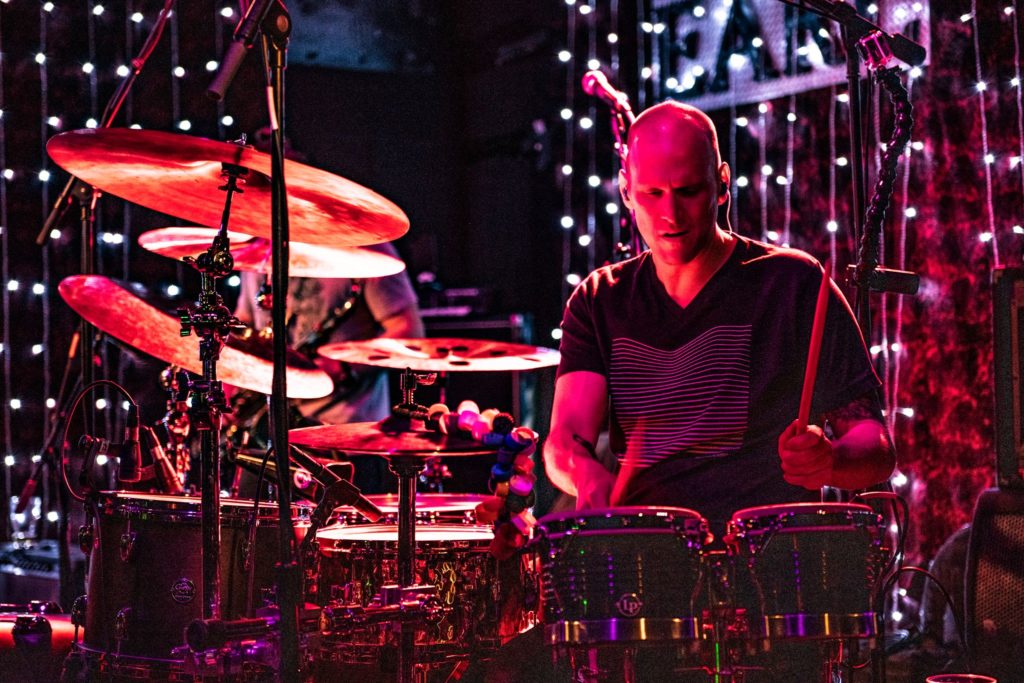
Kent Aberle. Photo by Carl Stolz
Lucas: You’re a drummer who didn’t start making good money until you were in your 40’s with Kristian Bush. Were there ever points before then where you wanted to give up?
Kent: My quest to be a professional musician started when I was 20 and started playing in cover and original bands. I made enough bread on those gigs that along with a day job allowed me to survive. I’ve been very fortunate and thankful of that. There is nothing wrong with having a day job. I still do work outside of gigs to this day. I just had the belief at 20 my career would be drumming and never gave up that dream. When I got the gig with Kristian it truly was a game changer for me not only with the gig check, but also the exposure I was getting as well as the level of people I was being exposed to. But the answer is “yes,” there was a time when I hit burnout before then and had quit. I had put together a band back around early 2006 or 2007 and I was the bandleader. It was a great band but didn’t last a year and it burned me out to the point where I actually quit the business for about 6 months and took a job as a customer service rep for a label company–not record label, like sticker labels. I just wanted to see the other side and see if I could enjoy a life where music was just a hobby. I lasted about one month and I was completely lost. I woke up and looked into the mirror one morning and said “I think today may be my last day.” When I arrived at work my supervisor and the president called me into a meeting and basically told me “Listen, we love you and can’t stand seeing you here because this is not who you are. You are a professional musician and that’s what you should be doing.” It was the nicest firing I ever had. LOL. I then went to work at a music store and rebuilt my career from there. It was a real wake-up call. We have to follow our passion and not question it but instead embrace that passion and let it drive our life decisions. I’m glad that happened to me.
Lucas: When I was in college my bandmates used to give our bassist a hard time because he had another band that only played covers and party music. We thought we were too artsy and sophisticated to play covers. However, he was the one that was gigging the most and always lending us money when we were broke. Can you talk about how playing in cover bands in the early part of your career shaped you as a drummer in a way that playing in an original band couldn’t?
Kent: I feel playing in cover bands had a monumental positive impact on my career. It works in a couple of ways. First off, on the drumming side, I had to learn how to play grooves and feels that are being played by a cover band for a reason . . . because they are legendary grooves. It forced me to learn how to play in different feels from metal to jazz depending on the gig situation. That’s something that’s really difficult for most people to do on their own as we normally lean towards what is most comfortable for us to listen to and play. It also taught me how to learn music quickly and maintain that knowledge to the point where if my band leader calls out a song and I kinda think I’ve heard it, I can at least get through the song with confidence, following cues and dynamics. It prepared me for live performance as I can’t think of another way to play in front of a live audience for 4 hours on the regular. On the professional side it really taught me how to be a true professional musician. First, I was getting paid so that’s part one. It made me learn how to make that money work for my life and not blow it on a bar tab. Second, it taught me the right way to do things as well as the wrong way to do things. I’ve played with the guy who had his stuff together and was making a good living doing the same gig that another guy is using to fulfill his ego, his addictions, and that guy is always the flaky one, late to gigs and just bad news. Lastly, it really taught me on how to appreciate everyone who makes a gig happen. The sound engineer, the door guy, the bartender, the waitresses and waiters, they all matter. I always try to engage with them and say thank you at the end of the night. It’s a great thing when you take a week off from a gig and sub it out and then upon returning the staff are like “Dude!! we missed you so much last week. It’s great to see you!” . . . and I’m just the drummer. Nowadays when not on the road I’ve been doing steady improv gigs in Atlanta which has been amazing for the soul.
Lucas: Can you talk about how having a DIY attitude and taking control of your career from a managerial perspective has helped you?
Kent: I’m very thankful to have been in college in the early 90’s which I feel is the last truly revolutionary decade of music. Labels were signing bands, independent labels were popping up everywhere. It was easy to live lean. There were tons of places to play. That decade was all about DIY. It was almost a right of passage to be a DIY band. I learned my DIY chops from bands like The Poster Children, Hum, and especially my friend Jeff Stepp who managed The Dungeon in Charleston, IL. I used to just go to his office above Friends and Co. (the attached bar) and just watch him work. He was managing The Blue Meanies from Chicago at the time and I truly fell in love with his work ethic. I signed up to be on the Dungeon street team and hung fliers in exchange for free entry to shows and then that attitude became part of my daily routine and every band I played in. Still to this day my band R.A.H. (Ross.Aberle.Hollifield) is totally DIY and I still love making fliers, album art, promoting shows, etc. It’s a form of survival.
Lucas: Why do you play Gretsch Drums?
Kent: The ones that stood out above the rest was always the Gretsch Renown or the Gretsch New Classic. They literally destroyed the highest end lines of every other company out there so in 2012, I think (I’m bad with dates), I called the folks at Gretsch and ordered a flat black Renown, and it is my touring kit to this day. I also have a Catalina Jazz I use for little in-town gigs as well as Catalina Club Rock configuration that I keep set up in my rehearsal space, mic’d and ready to record. It’s been an amazing relationship with Gretsch. I’ve had the pleasure of hanging with Fred Gretsch and Paul Cooper on a few occasions. I’ve visited the Gretsch site in Ridgeland, South Carolina and met the folks. Andrew Shreve is a true pleasure to work with. It’s an amazing family and I take great pride in carrying the Gretsch flag into battle every day.
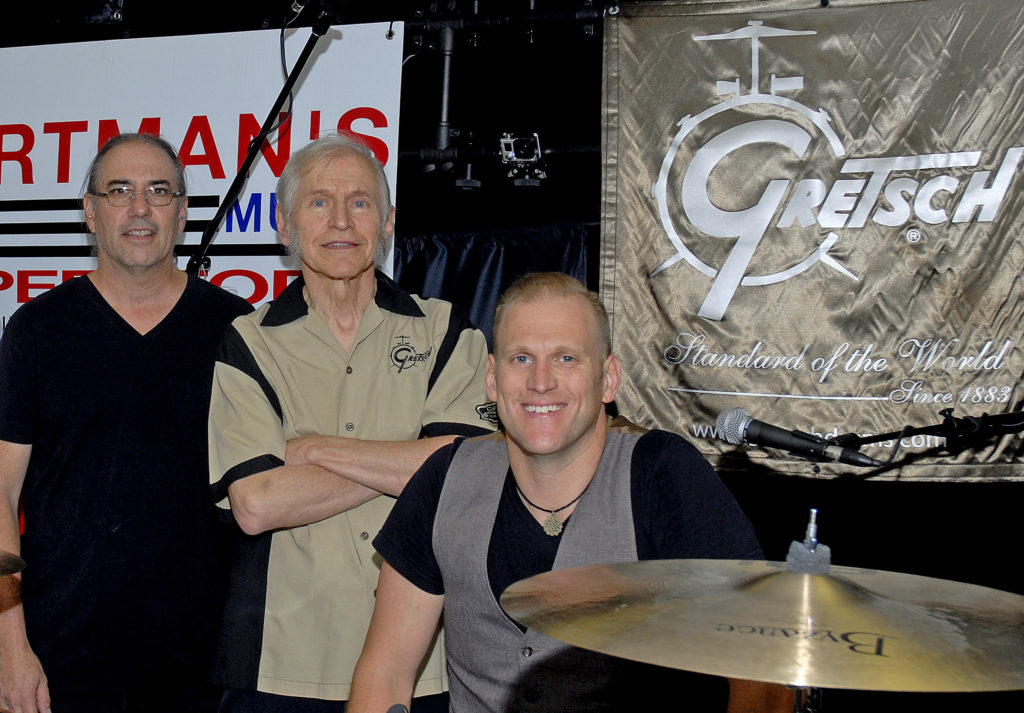
Paul Cooper, Fred Gretsch, and Kent at Portman’s Music, 2015.
Lucas: Can you talk about your audition experience with Kristian Bush?
Kent: I was teaching a drum lesson at my shop I owned for a bit in Atlanta and my landlord, Kenny Creswell of Avatar Events Group who is a incredible drummer himself, came in and said “Hey, you interested in a gig? It’s country. It’s a good gig. You interested?” I said “Of course!” Within a few days I got a call from Brandon Bush who is Kristian’s brother and music director. He offered me the audition and gave me 3 or 4 songs to learn in about 4 days. I canceled all of my lessons and literally locked the door and played the tunes for about 10 hours every day until they were implanted into my soul. On the day of the audition I came into the room and saw my friends Benji Shanks and Michelle Malone who were performing with the band. It gave me a calming feeling that I was with friends. Brandon set up a video camera and I played through the tunes. He told me thank you and told me the gig details and that if selected, I’ll receive a call. The next 3 or 4 days were so stressful. I was so nervous. Then the phone rang and Brandon offered me the gig. I then called my family. It was a great day. But I owe that gig to Kenny because if he hadn’t vouched for me it wouldn’t have happened. There is always a relationship that helps make things happen for me. Rarely has it happened on my own. Every good gig came from someone recommending me. Surround yourself with good people and cherish those relationships.
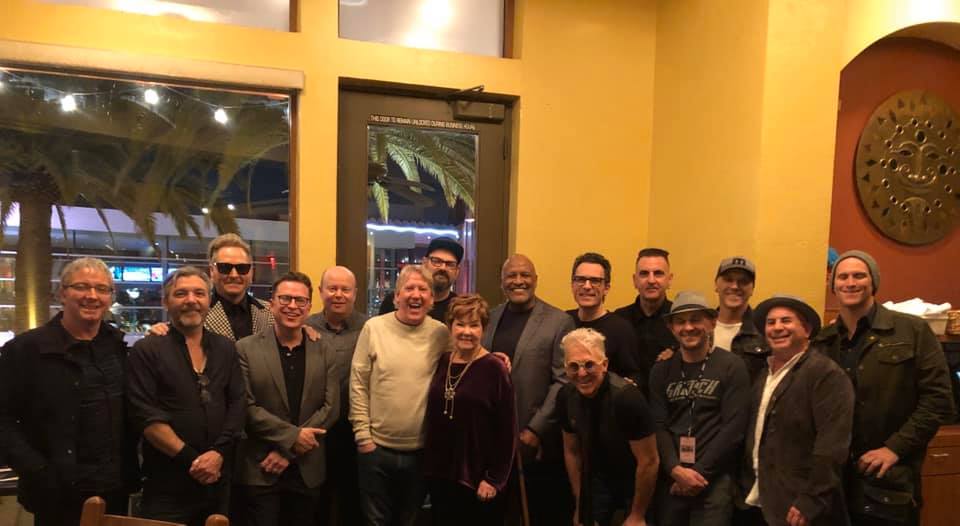
Kent (far right) at Gretsch Drums artist dinner, January 2020. Andrew Shreve and Dinah Gretsch, middle.
Lucas: I’ve heard you talking about how you have to decide if you want to do amazing things or if you want to own amazing things. Can you talk about this?
Kent: That belief system has been built on years of making mistakes. I made the mistake that many humans make in that OWNING stuff would make me happy. That belief will soon keep you from DOING what you love. I lived beyond my means for a few years and it damn near destroyed me. I’ve never felt so trapped and I won’t do it ever again. The mental and physical stress that puts you under is insanity. After I lost a house in the housing collapse in 2008, it completely changed my outlook. Over the next few years I fleeced my entire world. I was going through a divorce. I sold a ton of stuff that wasn’t serving what I wanted to do which was to tour and play drums. I went through my budget and eliminated everything that wasn’t serving what I wanted to do. I focused everything I did on being able to say yes when a tour came up and to every gig opportunity whether it was paying or not. I think my monthly nut was cut by two-thirds and it gave me a sense of freedom that’s really hard to explain in words. During all of that I got a call from The On Fires from Australia about touring with them, and saying yes set my career in a totally new direction. Over the next few years I saw the world and didn’t have to worry about doing it for money as I made enough to keep me on tour and have a place to go home to. They kind of saved my life. I learned so much on that tour. So many life lessons. The main lesson was the smaller I lived, the more it would allow me to do. Whether we work a full-time day gig and play on the weekends or are in a hard-working, full-time touring band, we are all musicians with different paths and all paths are to be respected. No path is always smooth but its the path we choose to take.
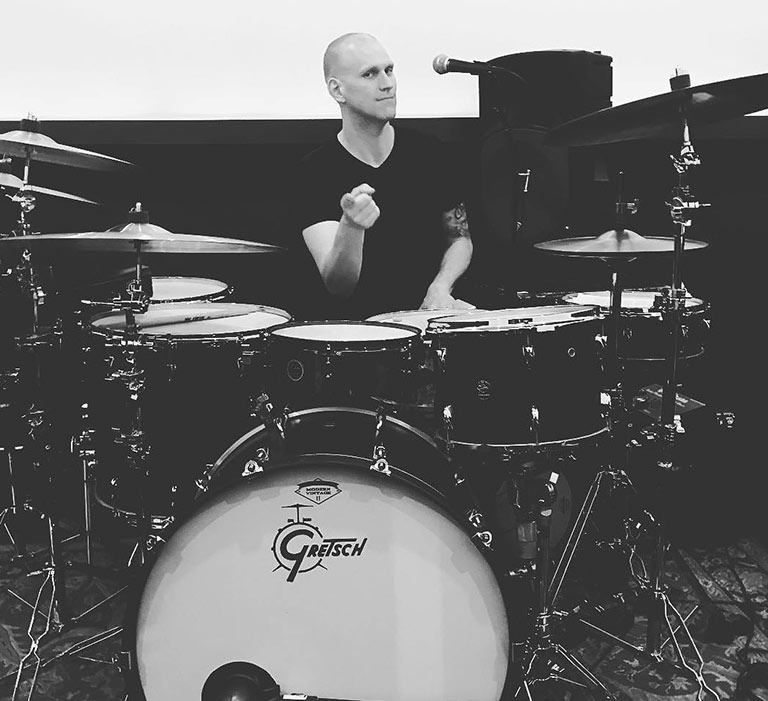 Lucas: You have a reputation in this industry as a consummate professional, somebody who is completely dependable and gets stuff done. Are you bouncing off the walls in this current lockdown situation? How are you staying sane?
Lucas: You have a reputation in this industry as a consummate professional, somebody who is completely dependable and gets stuff done. Are you bouncing off the walls in this current lockdown situation? How are you staying sane?
Kent: Thank you so much for saying that. I take great pride in what I do. I’m doing good with the lockdown situation. I’m very blessed to live in the amazing Virginia Highlands neighborhood of Atlanta, GA surrounded by trees, nature, trails, parks, etc. I’ve definitely battled a little no-live-show-depression but I’ve been doing a ton of writing and recording drums for fellow artists. I have a rehearsal space at Westview Rehearsals in Atlanta which is about a 10 minute drive from my apartment and I’ve tried to get there a few days a week for at least 4 hours each day so that’s been great. I’ve been going for long walks, running and exercising everyday, meditating daily, eating really well (I enjoy cooking), and spending time with my girl Kiva when I can. She’s a beacon of positivity.
Lucas: You’ve led quite an extraordinary life in a way, so many years of struggle and more recently years of greater success and acknowledgement. Did you always feel confident that things would eventually go your way if you stuck to it, or were there ever any moments of doubt?
Kent: One of my favorite quotes of all time is “Comfort is the enemy to progress” by PT Barnum. There were definitely moments of doubt. I think it is human for doubt to creep into your mind. I often think that doubt is sometimes due to us having to deal with an uncomfortable situation. Listen, living in a van with four other people and gear for a month or two at a time in the winter is not comfortable, but I wouldn’t change it for anything. I’ve always been a passionate person whether it was playing sports as a youth, drumming, etc. I just try to live every day of my life with a passion to make that day great, be a good human, and treat others with respect and compassion. We create the world we live in. We just have to decide what we want that world to look like and go make it happen. Failure and suffering is part of that but you shouldn’t let that define you. What defines you is how you react to that failure. If you own it, learn from it, and strive forward with that knowledge of the decisions you made that caused that failure, you can accomplish anything you want. My goal is to be playing jazz in a retirement home on the beach someday with friends until it’s time for my last groove. I’m going to just enjoy every breath I get to take and every groove I get to play until that day comes. Another favorite quote is “To be a man, one must be a non-comformist” by Ralph Waldo Emerson. Be you. Do you. Play every day and do it with passion and drive to do what you want to do and it’ll happen.
Follow Kent on Facebook, Twitter, and Instagram, and visit his website.
— Lucas von Gretsch
(Gretsch Generation 5)
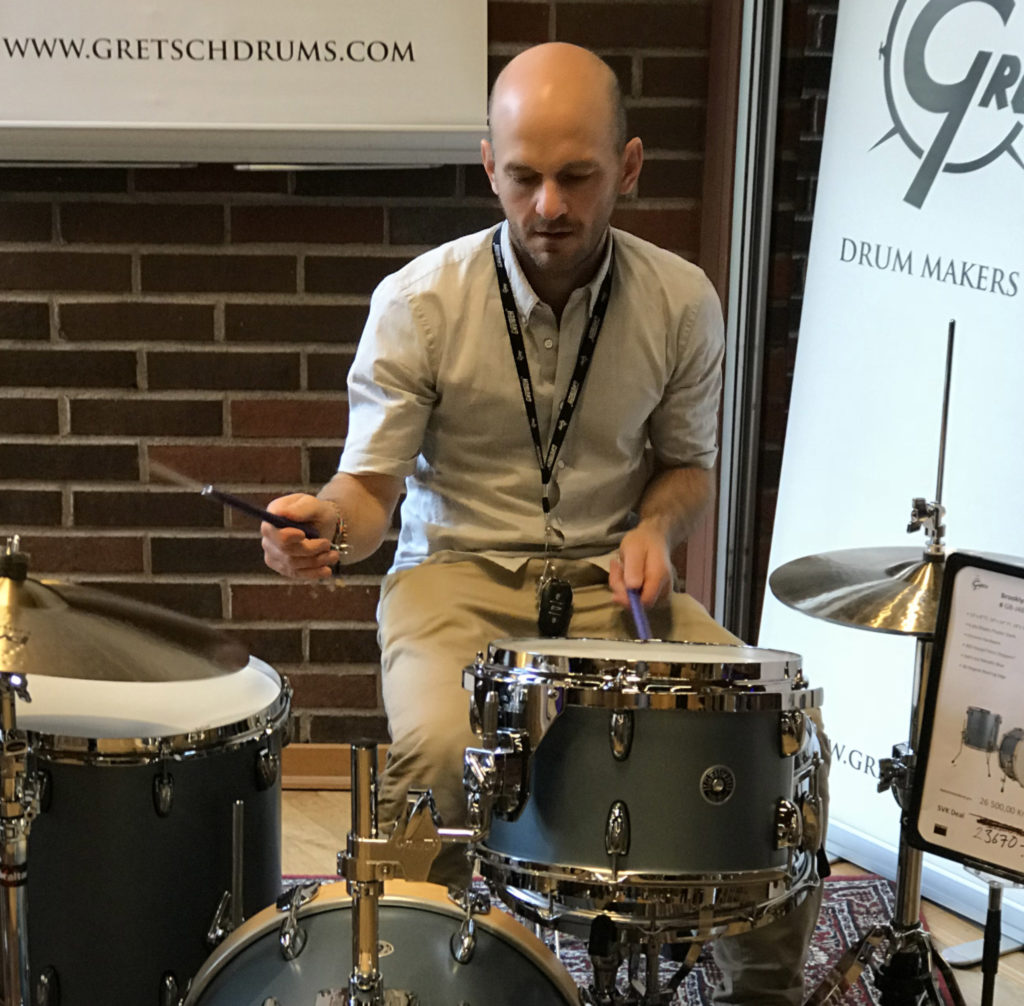
Follow Lucas on Twitter or send him an mail at lucas@gretsch.com



 Previous
Previous